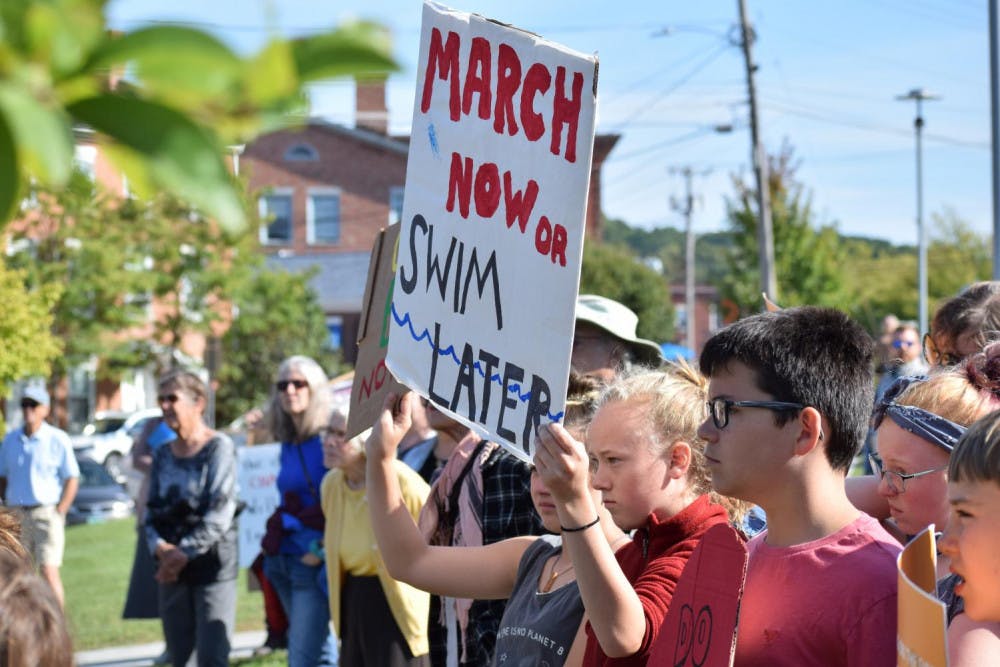Four million people across the globe went on strike last Friday, Sept. 20, because they know that for our world to understand the scale and urgency of the climate crisis, we must completely shatter our consent to the status quo that is killing us. Four million citizens of this world shouted and sang and screamed and cried that we cannot simply continue business as usual in a world of apocalyptic chaos.
Though I use alarmist language to describe the climate crisis, I actually don’t think much about this emergency anymore. When I first realized the scale and urgency of our current moment, the fires, floods, refugees, hurricanes and images of our demise bled into my brain and stained every moment. But there is only so much literature I could pore through before it simply became unproductive and self-destructive; before the fear became all-consuming.
That isn’t to say that I stopped this activism business. And it isn’t to say that I didn’t show up at the climate strike rally in Middlebury; that I didn’t stand on the steps of City Hall and pour out my thoughts on climate change to the 3,000 people who showed up to the rally in Burlington. And that isn’t to say that the climate crisis and all the contributing layers of oppression are not the reasons I get up in the morning, that I work to understand and combat this problem every day. They just aren’t the only reasons anymore.
Like so many others, I was steeped in the fear of our impending doom after the 2016 election and the IPCC report of October 2018. The cardboard signs at the strike echoed these fears with phrases like “There is no planet B” and “March now or swim later.” This messaging resonates with Greta Thunberg’s call-to-action. The 16-year-old Swedish climate activist who started these school strikes famously declared, “Our house is on fire … I want you to panic.” Unflinching in their declarations of institutional and generational responsibility, Thunberg and major climate justice organizations like Extinction Rebellion echo the alarm and fear. The crisis bled into their rhetoric, rendering it desperate, drowning and daring.
Thunberg’s rhetoric has a place. Extinction Rebellion’s cathartic actions have a place (wouldn’t you love to glue yourself to Jeremy Corbyn’s house?). They break down the blindness we have built up against our seemingly inevitable demise, and force us to reckon with our roles in the narrative of human history. Will I drop everything for this one thing that matters the most?
[pullquote speaker="" photo="" align="center" background="on" border="all" shadow="on"]I believe what sustains movements is the picture that appears in your mind when you think of why you wake up in the morning, and what you are striking for.[/pullquote]
However, narratives of fear and chaos can also drive us deeper into the climate anxiety that grips our generation. They might even paralyze potential activists. Fear and urgency can catalyze moments of mobilization; these charged events in which organizers have managed to make something out of the panic of a generation. But movements cannot sustain themselves purely on the fear of loss. No, I believe what sustains movements is the picture that appears in your mind when you think of why you wake up in the morning, and what you are striking for.
As I looked out at the crowd from the steps of City Hall at the Burlington rally, I felt the beauty of that truth, that picture, ripple through the crowd. Every person who flooded the street cared and wanted to be a part of a collective vision for a better world. When I spoke of the Green New Deal, the crowd cheered at the declaration of green job guarantees, decarbonization, regenerative agriculture, migrant justice and indigenous sovereignty. Those thousands of activists reminded me why I bothered to stand on those steps, to speak of legislation in Washington and Montpelier that does not even exist yet. It is the palpable enthusiasm for, and the faith in the concept of a Green New Deal, a vision, a promise to begin to untangle the web of oppression that has brought us here.
So I don’t wake up thinking of death anymore, heart hammering to the beat of the latest alarm screaming from the headlines. I wake up in the morning because I love the smell of sycamores after it rains. I wake up in the morning because this summer I learned to crave and appreciate getting my hands dirty in the garden. I wake up in the morning because I love long car rides with activists, learning about their lives and their passions and why they took this new exhilarating and uncertain path. The reason I wake up is grand vision found in the promise of tiny actions: planted trees, real, regenerative food, connections that pull us from our corners of the earth towards something greater than ourselves. Those beautiful moments are the seeds of the Green New Deal, the political vision’s essence as it struggles against the brutality of our American politics. The climate strike was a gorgeous, human moment, but it was just that — a moment. Following this moment in history, it is our responsibility to deeply question What will I do now? What will I fight for now? Will I drop everything, change everything, for this vision that matters most?
What will you do now?

Comments



